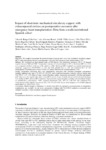Mostrar o rexistro simple do ítem
Impact of short-term mechanical circulatory support with extracorporeal devices on postoperative outcomes after emergency heart transplantation: data from a multi-institutional Spanish cohort
| dc.contributor.author | Barge-Caballero, Eduardo | |
| dc.contributor.author | Almenar-Bonet, Luis | |
| dc.contributor.author | Villa-Arranz, Adolfo | |
| dc.contributor.author | Pérez-Villa, Félix | |
| dc.contributor.author | Segovia Cubero, Javier | |
| dc.contributor.author | Delgado-Jiménez, Juan F. | |
| dc.contributor.author | González-Vílchez, Francisco | |
| dc.contributor.author | Manito-Lorite, Nicolás | |
| dc.contributor.author | De la Fuente-Galán, Luis | |
| dc.contributor.author | Brossa-Loidi, Vicens | |
| dc.contributor.author | Lambert Rodríguez, José Luis | |
| dc.contributor.author | Pacual-Figal, Domingo | |
| dc.contributor.author | Lage-Gallé, Ernesto | |
| dc.contributor.author | Arizón-del-Prado, José M. | |
| dc.contributor.author | Sanz-Julve, Marisa | |
| dc.contributor.author | Muñiz, Javier | |
| dc.contributor.author | Crespo-Leiro, María Generosa | |
| dc.date.accessioned | 2015-06-15T11:19:03Z | |
| dc.date.issued | 2014-07-01 | |
| dc.identifier.citation | Barge-Caballero E, Almenar-Bonet L, Villa-Arranz A, et al. Impact of short-term mechanical circulatory support with extracorporeal devices on postoperative outcomes after emergency heart transplantation: data from a multi-institutional Spanish cohort. Int J Cardiol. 2014;176(1):86-93 | es_ES |
| dc.identifier.uri | http://hdl.handle.net/2183/14678 | |
| dc.description.abstract | [Abstract] Objectives. We sought to investigate the potential impact of preoperative short-term mechanical circulatory support (MCS) with extracorporeal devices on postoperative outcomes after emergency heart transplantation (HT). Methods. We conducted an observational study of 669 patients who underwent emergency HT in 15 Spanish hospitals between 2000 and 2009. Postoperative outcomes of patients bridged to HT on short-term MCS (n = 101) were compared with those of the rest of the cohort (n = 568). Short-term MCS included veno-arterial extracorporeal membrane oxygenators (VA-ECMOs, n = 23), and both pulsatile-flow (n = 53) and continuous-flow (n = 25) extracorporeal ventricular assist devices (VADs). No patient underwent HT on intracorporeal VADs. Results. Preoperative short-term MCS was independently associated with increased in-hospital postoperative mortality (adjusted odds-ratio 1.75, 95% CI 1.05–2.91) and overall post-transplant mortality (adjusted hazard-ratio 1.60, 95% CI 1.15–2.23). Rates of major surgical bleeding, cardiac reoperation, postoperative infection and primary graft failure were also significantly higher among MCS patients. Causes of death and survival after hospital discharge were similar in MCS and non-MCS candidates. Increased risk of post-transplant mortality affected patients bridged on pulsatile-flow extracorporeal VADs (adjusted hazard-ratio 2.21, 95% CI 1.48–3.30) and continuous-flow extracorporeal VADs (adjusted hazard-ratio 2.24, 95% CI 1.20–4.19), but not those bridged on VA-ECMO (adjusted hazard-ratio 0.51, 95% CI 0.21–1.25). Conclusions. Patients bridged to emergency HT on short-term MCS are exposed to an increased risk of postoperative complications and mortality. In our series, preoperative bridging with VA-ECMO resulted in comparable post-transplant outcomes to those of patients transplanted on conventional support. | es_ES |
| dc.language.iso | eng | es_ES |
| dc.publisher | Elsevier | es_ES |
| dc.relation.uri | http://dx.doi.org/10.1016/j.ijcard.2014.06.036 | es_ES |
| dc.rights | Creative Commons Licence | es_ES |
| dc.rights | Reconocimiento-NoComercial-SinObraDerivada 4.0 Internacional | |
| dc.rights.uri | http://creativecommons.org/licenses/by-nc-nd/4.0/ | |
| dc.subject | Transplantation | es_ES |
| dc.subject | Mechanical circulatory support | es_ES |
| dc.subject | Extracorporeal | es_ES |
| dc.title | Impact of short-term mechanical circulatory support with extracorporeal devices on postoperative outcomes after emergency heart transplantation: data from a multi-institutional Spanish cohort | es_ES |
| dc.type | info:eu-repo/semantics/article | es_ES |
| dc.rights.access | info:eu-repo/semantics/openAccess | es_ES |
| dc.date.embargoEndDate | 2015-07-01 | es_ES |
| dc.date.embargoLift | 2015-07-01 |
Ficheiros no ítem
Este ítem aparece na(s) seguinte(s) colección(s)
-
INIBIC-ECAPE - Artigos [31]
-
GI- GRINCAR - Artigos [226]






